The ICISA INSIDER


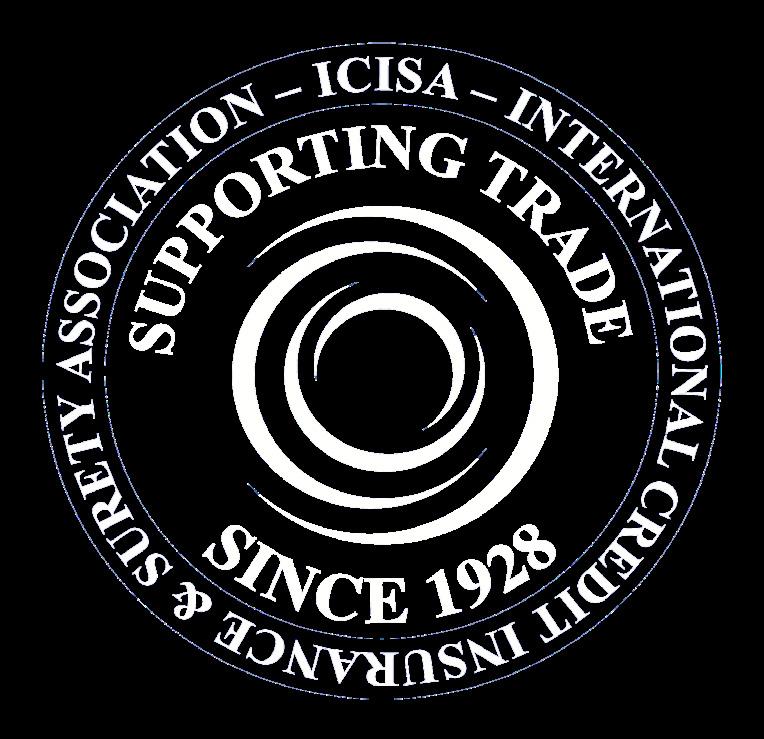
CONTENT
FOREWORD
COLUMN
4 | The value of giving and receiving feedback
Column by Magdalena Cano
ICISA UPDATES
5 | Updates from Committee Chairs
INSIGHTS
10 | Making a mark: New chair of ICISA Regulatory sub-committee speaks to the Insider about the challenges the industry faces and advocating for the sector
Interview with Jorg Stensinski
14 | From payment experiences to underwriting
Insight by Tobias Nießner
INTERVIEW
18 | Meet the underwriter: Frédérique Maris on the start of her career in Surety
Interview with Frédérique Maris
19 | Peak Re Joins ICISA
Interview with Kathleen Koh
ANNOUNCEMENTS


1 |
Newsletter of the International Credit Insurance & Surety Association (ICISA) The ICISA INSIDER | How to get a free Subscription? If you would like to be added to the distribution list of The ICISA Insider, please send a message to secretariat@icisa.org Editorial Information | For suggestions and announcements, please contact: Raluca Ezaru (editor) +31 (0)20 625 4115 Raluca.Ezaru@icisa.org Volume 19 | April 2024

Disclaimer All articles in the ICISA Insider represent solely the opinions of the individual authors, not ICISA, unless otherwise stated. Original articles appearing in the Insider may not be reprinted without the express permission of the author and ICISA. When citing articles, please refer to the title of the article, the author, and the relevant edition of the Insider, including a full url to the article page.
Foreword

Dear Reader,
Welcome to the latest issue of the ICISA Insider magazine, where we are delighted to bring you up to speed on the dynamic landscape of the Trade Credit Insurance (TCI) and surety industries.
The past months have been a whirlwind of activity for the Secretariat, as we've prepared for the third edition of the Surety Week—an event that continues to exceed expectations with each iteration. Additionally, the chairs of our committees, who have handed over to capable successors, share the topics of discussion of their meetings on pages 5-8. We owe these chairs a debt of gratitude for their guidance in the past two turbulent years. The committee meetings in Hong Kong and Porto have provided invaluable insights, and anticipation is building for the upcoming AGM in Madrid and Autumn meetings. Amidst the bustling schedule, the outcomes we're witnessing make every effort worthwhile.
Our insightful columnist, Magdalena Cano of Allianz Trade, explores the art of giving and receiving feedback in our daily and professional lives. As she aptly notes, feedback surrounds us, making her piece on page 4 an essential read.
In this Insider edition, you'll find an interview article with Jörg Stensinski on regulatory matters, which we trust you'll find it both informative and engaging. The article shows what ICISA is advocating on for the good of our industry. Basel 3.1-rules, the Late Payment Regulation are just some of the items, where ICISA makes its views and interests known to the relevant authorities and other interest groups in the interest of the wider business world.
Furthermore, turn to page 14 for an enlightening article written by Tobias Nießner, exploring the revolutionary impact of AI-based systems in evaluating debtor solvency. Highlighting the innovative strategies behind data analysis and AI modeling, Tobias Nießner underscores the transformative advantages over traditional approaches.
We are also privileged to feature an interview with Frédérique Maris from Zurich, offering a fresh perspective on her two-year journey in the industry. Read her experiences and insights on page 18. Furthermore, we are thrilled to welcome two new members— EXIM Thailand and Interamerican—into the ICISA family. Read an exclusive interview with Kathleen Koh from Peak Re, which joined ICISA last year, to discover their aspirations through ICISA membership, on page 19.
Happy reading!
Best regards,
Richard Wulff
3 | The ICISA INSIDER | April 2024 Foreword |
The value of giving and receiving feedback
Column by Magdalena Cano, Credit and Surety Senior Underwriter, Head of Surety at Allianz Trade

Feedback is a vital element for the functioning of systems. Living beings are self-producing systems. The term of autopoiesis coined by Chilean biologist Humberto Maturana in the 1970s, is fundamental for understanding what a living being is. What differentiates us from other living beings is language. It is through communication that we interrelate and influence each other.
Each of us, as closed complex systems, participates daily in multiple systems and subsystems. Some, such as our employer company, our family and our professional team, are the closest. Others are more difficult to understand but also influence our lives, such as the financial, economic, political and social systems we are embedded in. The level of complexity is maximum and to maintain our life we self-produce and constantly adapt. Feedback serves as a guidance and ensures our corrective actions.
Let's focus our attention on several examples of feedback in our daily professional lives. If we think about the conversations we have with our managers, clients, employees, coworkers, we constantly receive and give feedback. On many occasions unconsciously and automatically. On some occasions we are expressly asked to give and receive feedback (Mid and yearend reviews; 360 Tools; Client satisfaction queries…). When required, we pay attention and assume responsibility for giving and receiving feedback that contributes to achieving defined objectives. Both when we receive and when we give
feedback we show our personality, temperament and values. We should be aware that in our conversations with other people we trigger emotions in others, which in turn result in actions and behaviors which trigger back on us. Being aware of this aspect is essential to build up and take care of human relationships including professional ones. How we give and receive feedback generate positive emotions such as trust, inspiration, respect, sympathy, as well as negative emotions in the opposite direction. It is important to be aware and assume that responsibility.
Last month, the ICISA Spring Meeting 2024 took place in Porto. We all took the opportunity to exchange, interact and return home with many impressions and feedback. In the ICISA system, there are industry experts, managers, underwriters from different generations, cultures and genders. Each of us has different personal and professional stories and backgrounds. Feedback for the proper functioning of our association has great value and we all must assume the responsibility of giving and receiving feedback to be able to capitalize on the available resources to ensure that our efforts are effective adapting to the changing environment. What are our common objectives, how do we achieve them, what means do we have, how do we communicate, how do we grow... All of these questions require a constant and responsible feedback, which will ensure keeping our valuable ICISA lively.
| 4 April 2024 | The ICISA INSIDER | Column
UPDATES FROM ICISA COMMITTEES
Asia Committee update
Jerry San

It was truly an honour of mine to chair the ICISA Asia Committee meeting in Hong Kong and a pleasure to meet again the familiar faces we met in Bangkok last year, and members who are newly invited to the ICISA family. This year, the ICISA Asia Committee saw another record turnout with 34 delegates. I would like to express my heartfelt gratitude to the members for the tireless participation and generous insights sharing during the meeting.
The Tour de Table, which traditionally kicks off the session, laid a solid foundation for discussions, with delegates sharing their views on the industry and market environment. To sum up – the global economy is gradually recovering from impact of Covid, losses are benign in 2023 and no major disruptions in the markets. 2023 marked one of the bestperforming years for global trade credit, benefiting from support schemes implemented by various countries.
However, there is no room for complacency. It is expected that the macro trends of 2024 will be mainly geopolitically driven, with uncertainties clouding around election of major economies and geopolitical tensions. The upcoming election super-cycle will witness over 40 elections across the globe, with more than 10 in the region likely to drive political uncertainty, populist agenda, policy changes, and even civil unrest. US-China tension, a topic close to everyone's heart, will remain the driving force of the global and regional realignment and US elections will be carefully watched. In addition, the "China de-risking" agenda may create more opportunities for emerging markets in the region in terms of the supply chain.
 Jerry San Vice-Chair of Asia Committee
Jerry San Vice-Chair of Asia Committee
While the world’s attention is on the US and China, we must not overlook India, another fast-growing economy. India's remarkable growth over the last decade is expected to continue, transforming it from a bottom-of the pyramid economy to a middle-class and mass affluent led economy. Infrastructure boost and alternative manufacturing are among the major themes expected to drive India's growth in the next seven years. In my view, the trade credit market and surety will continue to expand their offerings amidst the growing economy, particularly since Insurance Regulatory and Development Authority (IRDA) of India has taken necessary measures since 2019 to regulate Surety, opening doors for members to consider establishing a foothold in this market.
Regulatory landscapes are improving in China and India, yet complexities around legal recoveries, enforcement of securities, etc.,, especially in cross border transactions. Members are encouraged to seek support from legal experts to navigate the risks and make informed decisions.
ICISA Asia Committee 2024 meeting was yet another successful event. On top of the technical insights and knowledge, I believe that members also took away valuable friendships. Together with the committee, we look forward to regrouping with the next occasion to comprehend the complex risk topics and collectively contribute to the industry’s healthy growth.
5 | The ICISA INSIDER | April 2024 ICISA Updates |
Surety Committee
Nils Hoppenworth

Dear Surety community,
Great discussions have emerged during our meetings in Porto, initiated new ideas and revisiting old topics from different angles. We used the analogy of a wave to illustrate various positions: whether you’re riding the wave or have been already smashed down by it. This analogy can be applied to many current macroeconomic scenarios, such as the commercial real estate bubble, peaking interest rates, high inflation and high rates in insolvency proceedings. All these issues are accumulating like waves, piling up and potentially having a massive impact.
We have summarised the topics discussed, which remain relevant for the next months, under “market disruptions”. Everyone was in agreement that the intelligent underwriting ensures the resilience of our industry. Although risk may seem more complex, underwriting needs to adhere to the basics to analyse risk. We highlighted market disruptions such as supply chain bottlenecks which could lead to increased costs or production disruptions due to the delayed or missing supplies. Particularly in cases where supply sourcing is highly concentrated, this could result in significant financial difficulties.
Another disruption could be caused by cyber attacks, which disrupt payments within a company and interfere with cash payment and collection. Production could be completely disrupted, leading to financial impacts. Furthermore, changes in regulations or directives could affect the work of contractors and push them into financial burdens – for instance, new legislation in the UK imposing stricter building safety standards in cladding following the Greenfell Tower disaster. In some cases, general contractors might be severely affected by solving such claims on construction site.
 Nils Hoppenworth Chair of the Surety Committee
Nils Hoppenworth Chair of the Surety Committee
Following these discussions, we concluded that basics like the four Cs of surety should always be in underwriter’s mind as along with common sense. Clear and transparent communication is of utmost importance as it builds trust among the stakeholders involved.
It’s important to note that in each disruption, there is also an opportunity– thus, the intelligence of underwriting is required.
Since intelligence is closely linked with human capital, we focused our discussion on education and talent management and how ICISA assists on lobbying for talent. In terms of education, the new set up with working groups governed by the Surety Committee Charter ensures focus and execution of white papers or materials for newcomers and rookies in the industry. An excellent example for a result of a working group is the Surety Glossary. We aim to speak the same language with the same terminology and facilitate the access to surety topics that underwriters deal with day in day out with routine and experience. The knowledge needs to be retained and preserved.
The war for talent is certainly critical for all industries and we discussed about lobbying and cooperating with universities, as well as setting up our own academy for surety expert who start from scratch and want to advance.
A big thank you for all contributions throughout the meetings; it was a pleasure and an honour to chair the Surety Committee.
| 6 April 2024 | The ICISA INSIDER
| ICISA Updates
Single Risk Committee
Julian Spiegel

Over the last four years, we have experienced back-to-back crises, starting with the pandemic in late 2019, leading up to the Russian invasion of Ukraine in early 2022, and finally with the Hamas attack on Israel in October 2024 and the subsequent war in Gaza. At the Single Risk Committee meeting in Porto, it felt like the credit and political risk insurance (CPRI) market has by now learned to cope with an environment where conventional wisdom has lost some of its value and where surprises are the only reliable thing.
The coming months appear to be a continuation of this kind of volatility and uncertainty. The global power balance is shifting, with relationships between the US and China still at a historic low. The world is going through its biggest election year ever with 77 contests including in the US and in the EU. Trade flows are being rerouted with Russian oil going into India and Chinese exports to the US taking a detour via Mexico. Higher inflation and interest rates have put some Emerging Markets, particularly on the African continent, in very tight spots.
Against this backdrop, it is highly surprising how resilient the CPRI markets have proven to be. Insurance capacity remains strong. There is some loss activity from the ongoing restructuring in Ghana, from political violence in Ukraine, and from expropriations and sanction-related incidents in Russia. However, overall loss levels are expected to continue to remain at manageable levels for the CPRI markets.
CPRI markets will continue to carefully select risk pockets in terms of products and regions that are sustainable through the cycle. The divergence of risk appetites and business appetites is ongoing. There is an increasing interest to work more closely with banks on structures such as SRTs and swaps, mainly in developed countries. There is also a renewed interest in asset-based classes such as aviation financing. In politically riskier jurisdictions, CPRI markets are strengthening their relationships with multilaterals and ECAs.
 Julian Spiegel Chair of the Single Risk Committee
Julian Spiegel Chair of the Single Risk Committee
A potential game changer is the implementation of Basel IV. Over the years, banks have become the largest buyer group in the CPRI market. There is a risk that conditional CPRI policies will be less effective in reducing capital requirements for banks when the new regulation comes into effect. This would change the nature of the market which relies on conditions, on meaningful waiting periods, and on proof of loss. ICISA is very actively involved in those regulatory discussions and Daniel de Búrca does a great job of keeping us updated.
Overall, the market sentiment appears to be one of cautious optimism. The Single Risk Committee continues to constitute a great place to check in with the market, and to support the provision of consistent and reliable insurance capacity. To increase visibility and to play a more prominent role in shaping our industry, the Single Risk committee will inaugurate working groups with the ultimate goal of issuing white papers on pertinent topics.
7 | The ICISA INSIDER | April 2024
ICISA Updates |
Credit Insurance Committee
Thomas Meyer

Quite a variety of topics were addressed at the Credit Insurance Committee meeting in Porto, including the question of whether the ongoing evolution in the fields of automation, digitization, and online trade may lead to either an increase in fraudulent activities in trade and financial transactions on the one hand, or better opportunities to detect fraud on the other hand.
Another discussion arose about the differences in Comprehensive Cover, triggered by the question of whether certain elements of Political Risk, Political Violence, War, or Terrorism would generally always be included. The answer was largely “not really,” as every policy would have to be considered on its own merit according to factors such as markets and countries, industry, jurisdiction and regulation, financial requirements, involvement of a funding bank or other financial institution, and obviously the insured, buyer, and insurer.
An update on the ICISA LGD study and the recent ICISA Asia meeting in Hong Kong were given, as well as an introduction to a potential upcoming cooperation between ICISA and PASA, which may address, for example, education, advocacy, data, and committee work on certain industry standards.
The most prominent topics of the CIC meeting, however, turned out to be the newly established working groups, to which a number of committee members are contributing significant time and work. At the last (online) meeting in
 Thomas Meyer Chair of Credit Insurance Committee
Thomas Meyer Chair of Credit Insurance Committee
November 2023, it was agreed to set up two working groups to drill down on a specific topic each, one on “Banking and Finance” and one on “Mega Trends.” And in Porto, we enjoyed the first feedback from the two groups. The “Banking and Finance” working group has identified the role of banks as insureds and as beneficiaries of credit insurance as one of two main focal points, while the other one is Factoring respectively the Credit Insurance of Factoring, both recourse and non-recourse. Further refined EU and Basel regulation that will likely impact the topic is expected to progress in the course of 2024, and the working group will provide updates to the committee accordingly.
The other working group, “Mega Trends,” has progressed already quite far and provided a detailed presentation on their findings. A number of major global long-term developments were identified and categorized, and the working group has been focusing on those trends that have been recognized as the most relevant ones for the Credit Insurance industry. These include the two “meta-trends” Digitization and ESG, whereby a meta-trend is considered to be a mega-trend that itself impacts on most if not all other mega-trends. The third mega-trend addressed is an obvious one for Credit Insurance: Global Trade. The working group elaborated on the details, impacts, projections, and expectations of those three trends and aims to cover more mega-trends going forward. It will be exciting to see what the two working groups will develop on the way to the next CIC meeting or two.
| 8 April 2024 | The ICISA INSIDER
| ICISA Updates
Committee of Underwriters
Fabrice Nessi

Last month, at the ICISA Conference in Porto, our Committee of Underwriters enjoyed a record attendance of 29 members. As with the Brussels event, the reason for this large attendance was probably the new format of the conference, allowing participation in two committees. However, there were even more ‘historical’ participants than usual, so we can consider this meeting a success.
The agenda started with the usual roundtable discussion where everyone presented the current situation in their own country. We had some detailed discussions about two countries (the economics and geopolitical situation of Turkey and the resilience of Argentina’s economy), three sectors (automotive, agrifood, and real estate), and three specific topics (the growing importance of geopolitical issues, fraud prevalence, and NCB exclusion waivers).
Additionally, the Management Committee of ICISA asked us to generate insights into the industry which can help with wider goals of advocacy, public relations, and building wider understanding of our products. We concluded the meeting with two breakout sessions to debate these Working Group projects.
The two subjects will be Risk Accumulation and the Role of Trade Credit Insurance in the Economy. Both elements should support members in their own thinking, but also address gaps in knowledge that the outside world may have. The first subject arises from the fact that tracking accumulation is key to insurers and reinsurers because Credit and Surety is one of the main businesses that generate ‘per risk’ in the industry (vs ‘per event’). At the same time, many markets are experiencing growing concentration, via Mergers & Acquisitions or just ‘Winner Takes it All’ effects (e.g. Amazon, large retailers, or contractors). Different regulators are noticing this increasing concentration and are asking for further reporting and simulation. Insurers have to cede more capacity to their reinsurers (on Excess Loss treaties, for example). We will provide a state of the situation,
 Fabrice Nessi Chair of the Committee of Underwriters
Fabrice Nessi Chair of the Committee of Underwriters
including the constraints that the industry is facing and how we can communicate this to regulators.
The second topic is about explaining regulators and policyholders how the product works and the decisions an insurer may take related to this. Following the publication of recent papers by two EU institutions (EIOPA and the European Systemic Risk Board), potential misconceptions about how cancellable limits function have arisen. This includes whether reducing exposures during an economic crisis could have a systemic impact on the real economy. The aim of the paper will be to demonstrate that credit insurers act responsibly and reasonably with credit limits, that wholesale cancellation is not beneficial, and therefore that the product is unlikely to constitute a systemic risk. Thank you to Micaela Cojocaru and Renate Kerpen for taking the lead on these two subjects.
Finally, I would like to specifically mention the Real Estate sector, where the situation varies greatly by country, but most markets are facing difficulties. In France, for example, we have seen a drop in residential sales of more than forty percent in two years and, while it is heavily impacting the homebuilders, the developers seem to show some resilience until now, even if they have to set up some social plans. The latter are cash-rich after years of profit and they enjoy some diversity in their activities (commercial, logistics, infrastructures). For homebuilders, the picture is less rosy because they are mainly selling to low to middle-income earners, who are facing a sharp rise in borrowing costs. Additionally, they are enduring fierce competition from large contractors that are pursuing smaller projects. Finally, they are particularly affected by the recent rise in construction costs due to new environmental norms. We can estimate that the recent revision of the budget deficit by the government (from 4.9% to 5.5%) can be entirely explained by the unexpected loss of property tax (volume and value) and social charges on the sector, which represents eleven percent of the French GDP.
9 | The ICISA INSIDER | April 2024
ICISA Updates |
Making a mark: New Chair of ICISA Regulatory Sub-Committee speaks to the Insider about the challenges the industry faces and advocating for the sector.
An interview with Jörg Stensinski, Chair of Regulatory Sub-Committee

In recent times, ICISA has worked hard to grow both its profile and its impact in advocating for its members and the industry. This has seen an increased intensity in engagements with key policymakers and regulators, as well as a proactive effort from the association to be at the forefront of public discussions related to trade credit insurance and surety.
Behind these efforts has been the guiding hand of the ICISA Regulatory Sub-Committee (RSC). This important group gives members the opportunity to identify and discuss key regulatory issues faced in the course of doing business. Responsibility for advocacy within ICISA’s governance structure ultimately lies with the Management Committee. However, to allow for more in-depth analysis, the RSC is delegated the task of following these topics closely.
The RSC is open to all members to join and participate in. In fact, its strength lies in the breadth of voices and perspectives that are heard there. This is why making sure that members participate in these discussions and the wider work of the RSC is so important. The RSC works to identify which topics should be prioritised for advocacy by ICISA; provide expert advice on the potential impact of regulatory change; act as an important communication link between member companies and ICISA on key issues, and; ensure that the secretariat has the information needed to do its job.
| 10
April 2024 | The ICISA INSIDER | Interview



The leadership of the RSC is also a vital role in helping shape ICISA’s advocacy agenda. Prior to this recent departure from Atradius, that task fell to Olivier David. However, we were incredibly pleased that another Atradius colleague, Jörg Stensisnki, Group Risk Management Director of Atradius agreed to continue that work and become chair, effective immediately.
Jörg is no stranger to the work of the RSC or ICISA in general having previously participated in advocacy efforts related to Solvency II and more recently, stepping in as the representative of Atradius on the ICISA Management Committee. As an introduction to his Chairmanship of the RSC, we discussed his priorities for the subcommittee and for ICISA’s advocacy activities.
11 | > > > Interview
Jörg Stensinski Chair of Regulatory Sub-Committee
| The ICISA INSIDER | April 2024
Can you tell us a little about your background and what your role is at Atradius?
I am a German who moved to the Netherlands in 2001 for a job in the banking industry. The original plan was to leave after a few years, but somehow, I got stuck in this great country. Access to international roles here also attracted me to stay longer.
I’m an economist and statistician by training and, after a short stint in the pharmaceutical world, have always worked in the financial industry, mostly in a risk management role.
I joined Atradius in 2007 and have been Director of Group Risk Management for more than ten years. This includes responsibility for Enterprise Risk Management, capital management and Solvency II, outward reinsurance, risk governance, and all kinds of model development.
How important are regulatory topics in your daily work?
Regulatory matters - and regulators – have been a constant presence throughout my professional career. Even at the start of my career in the pharmaceutical industry, conducting and assessing clinical trials was done in compliance with strict regulations. I have had significant involvement with regulations, such as the Basel standards, during my time in the banking industry, and Solvency II since joining Atradius.
I previously chaired ICISA’s Solvency II Expert Group for a period of time – a group that helped to develop ICISA’s response to several aspects of the insurance prudential regime as it applied to credit insurance and surety. Solvency II remains a crucial driver within risk management departments, as local and European regulators frequently provide feedback and pose questions within this framework.
On top of this, new requirements have emerged in insurance accounting (IFRS17) or related to ESG. I see many tax requirements and regulations, and as the person responsible for Business Continuity, I also need to keep up with the latest requirements on Operational Resilience. And let’s not forget data security (GDPR, etc) and sanctions compliance too. I am fortunate to work with capable and experienced colleagues on all of these aspects on a day-to-day basis.
The pace and intensity of regulatory changes has increased in recent years, and this has been challenging to the industry. We are now faced with an increased scope of regulation, a greater number of regulators - particularly for global organizations like Atradius - and an accelerated pace of new proposals. All of these require a careful and effective response for individual companies, as well as for the industry overall.

| 12 April 2024 | The ICISA INSIDER
| Interview
What has been your involvement in ICISA’s advocacy efforts to date, and what are your priorities as chair going to be?
As mentioned, I was previously involved in the Solvency II Expert Group as the Chair. We played a crucial role in the lead up to the implementation of Solvency II in 2016. This included making significant efforts to try to improve the Standard Formula – one of the most important aspects of the entire framework – and make it more realistic.
Throughout my involvement with ICISA, I have also taken part in several discussions with EU institutions in Brussels on topics such as Marketability. That is the framework for regulating competition between public and private on export credits in the EU and an important topic for many ICISA members. As well as the topic itself, it was useful to meet with officials and understand where they are coming from when they make decisions that effect the sector.
These are the kinds of important topics that the RSC deals with regularly. I believe that ICISA and, by extension, the RSC can play a significant role in representing the entire CI & Surety industry. That also includes non-EU regulatory and advocacy topics. The RSC must work for all its members wherever they are located. While the EU will always remain one of the most important stakeholders for our sector, we cannot ignore major developments in other markets.
As chair of the RSC, I believe we need to continue the successful work that has been started and maintained by my predecessors, the members, and the secretariat. I look forward to discussing with the RSC members their desires and proposals and hopefully we see even more members participating there. It is crucial to stay up to date with important developments and address key topics. Together, we should decide on an appropriate process.
Advocacy is one of the key functions of ICISA – why is this important to members and what are the key issues facing the sector today?
In my opinion, advocacy is the primary reason for the existence of ICISA. Within ICISA, we can unite our strengths to shape and improve the regulatory environment. Education of stakeholders in various regulatory areas is a crucial part of ICISA's advocacy efforts. It is essential that regulators understand the importance of CI & Surety in the
real economy. And through ICISA, we have a platform for effective communication with those important audiences.
The primary challenge will be to identify and monitor any regulatory changes affecting CI & Surety or the wider financial industry. I’ve mentioned several areas, such as the banking rules, Solvency II and the prudential framework for insurers, ESG, tax, and many other topics that are growing in importance. Unfortunately, there is not one main issue. Regulation addresses many areas as mentioned before, across legislations and countries. It is the obligation to comply with them, but let’s ensure that they are fit for purpose.
Finally, why should ICISA members be involved in the RSC?
ICISA is the platform for the industry to communicate and advocate. Therefore, it is in the interest of all members to be involved. Although we are a small industry with a wide range of products, we have a great deal of expertise and experience. Let's make use of this and continue to have a great, effective, and knowledgeable committee that advocates for all members.
The ICISA Regulatory Sub-Committee meets regularly throughout the year and discusses the major regulatory and policy questions facing the trade credit insurance and surety sector. The first meeting of the RSC under Jörg's leadership will be held in the near future and we want to ensure that all members have the opportunity to participate.
Having your company included in updates to the RSC also ensures you have access to the updates and feedback opportunities that come through this group. If you would like to know more about participation, please contact Daniel.deBurca@icisa.org to discuss further.
13 | The ICISA INSIDER | April 2024
Interview |
From payment experiences to underwriting
Article by Dr. Tobias Nießner, Product Owner AI, SCHUMANN
In recent years, the assessment of debtor solvency has been characterised by external influences on companies, which have made the use of traditional methods for interpreting and evaluating existing data more difficult. Especially in such dynamic times, AI-based systems offer much greater flexibility in terms of adapting the interpretation of a wide variety of developments. At SCHUMANN, we focus on the analysis of internal payment experiences, which, in addition to other data sources, can provide important input for ratings and thus directly improve the information basis on which limit decisions are made.
In the following, we present our development approach and outline the requirements for the use of AI-based systems.
1. Preconditions for the Use of AI-Systems
The first step for a company is to develop an appropriate data strategy for payment history analysis, which involves assessing the current state of document documentation. It must be clarified which data management dependencies exist and which interfaces already exist or need to be created. This includes documenting process dependencies and performance requirements in order to be able to respond flexibly to corresponding IT requirements at a later stage.
2. AI Modeling in Payment Experience Data
If these requirements are met, we offer the ability to support different business use cases based on three different models. At this point, it is important not to underestimate the amount of research and development that goes into data validation, quality assurance and other requirements that directly affect the performance of a model. It is important to define how irrelevant or inconsistent data will be handled and what individual adjustments will need to be made to the data model. This requires coordination at both business and technical levels to jointly eliminate unwanted side effects and achieve a robust prediction.

| 14 April 2024 | The ICISA INSIDER
| Insights

We have developed three different models that allow us to further optimise our customers' receivables management. Based on a debtor's historical payment behaviour, we have succeeded in developing a model that is able to predict very accurately the deviation of a payment from the due date. This enables not only risk assessment of individual documents, but also modelling of a company's liquidity. We have developed a wide range of processes to ensure the above aspects of data quality assurance and, in this respect, model forecasting, which also enables us to develop client-specific models.
We also analysed payment patterns to classify debtor behaviour over time and to identify changes. In this context, we developed a model that classifies debtors at time x (specified by the receipt of a payment) using a clustering approach. From the technical task, we were able to derive a functional definition of the clusters found, which allows us to distinguish between early, late, discount and on-time payers, as well as to identify unstructured payers. The advantage of this analysis is that it is possible to better assess the development of an individual debtor, as well as changes in the clusters of the entire debtor portfolio over time.
For a third model, we extended the overall picture of a debtor to determine an internal rating based on the probability of default. We were able to show that the AI system optimised traditional rule-based analysis for the development partner data pool. Fewer insolvent debtors were incorrectly assigned a good rating based on internal payment experience, but more insolvent debtors were correctly identified by the prediction (see Figure 1). Following the question of the feasibility of the forecast, we analysed different look-back and lock-ahead time windows and concluded that the internal payment experience offers its best performance for a forecast of 3 months.
We use a variety of approaches to ensure the traceability and transparency of both our modelling and the decision-making process for the models. We use best practice approaches to make the impact of individual variables on the output of the model measurable. This allows us to identify potential unintentional biases during model development and also ensures that the model output is causally traceable to the user.
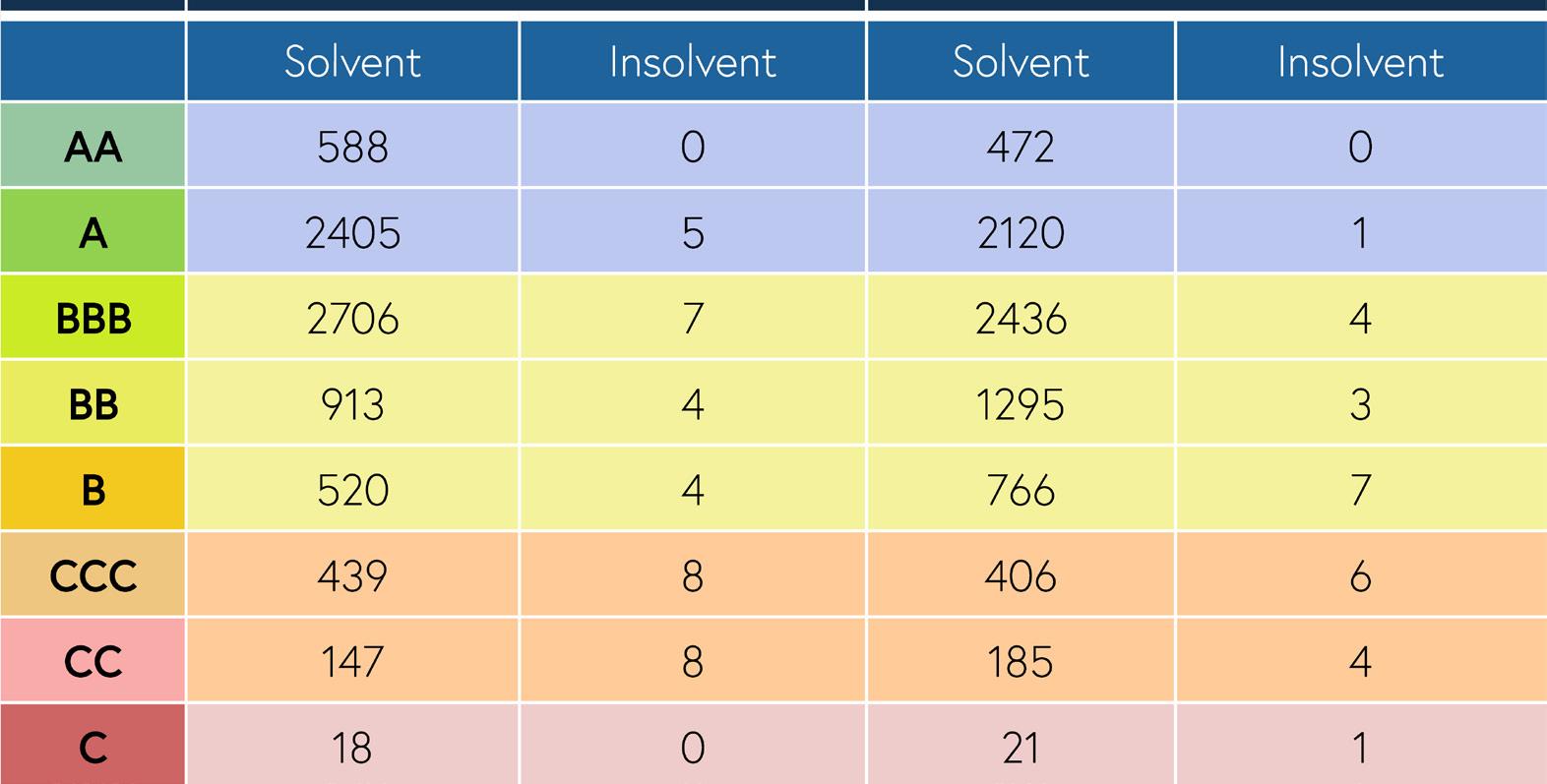
15 | The ICISA INSIDER | April 2024 | 16
Figure 1 - Rule-based rating compared to AI-based rating
Interview |

These models provide a bridge to the analysis of internal payment experience in the overall context of the variables used to support limit decisions. Any optimisation of the data quality of individual inputs of usual processes, such as internal payment experience in addition to credit bureau ratings or financial statements, always has the advantage of providing a more accurate and better overall picture (see Figure 2). Therefore, our research and development regarding payment experiences is the first step of refining the general process for assessing a debtor and making a limit decision based on a 3-month forecast in the future.
It is already clear that the most robust and accurate forecast possible in future will be based on many individual optimised data views of the debtor that will be automated through AI. The dynamic adaptability of AI systems and defined retraining processes also ensures that the data is up-to-date in the form of a constantly adapted assessment that can be consistently expanded in the future in line with external influences.
AI-based systems can help take your limit decision processes to a new level and make them future-proof. While there is of course a certain amount of effort involved in preparing data-driven processes, their use has clear advantages over traditional rule-based approaches in terms of objectivity and performance, and can support the decision maker with the best information currently available.

Tobias Nießner holds a PhD in Business Information Systems from the Georg-August University of Göttingen. He studied mathematics and business information systems with a focus on data science. During his PhD, he worked on risk use cases in accounts receivable management. He joined SCHUMANN in 2023 as Product Owner to enable the product landscape with AI capabilities.
| 16 April 2024 | The ICISA INSIDER
| Insights
Figure 2 – Integration of AI in limit decision processes
A Guide to Trade Credit Insurance
By the International Credit Insurance & Surety Association
A practical and accessible industry-wide reference on Trade Credit Insurance, written by a team of industry experts.
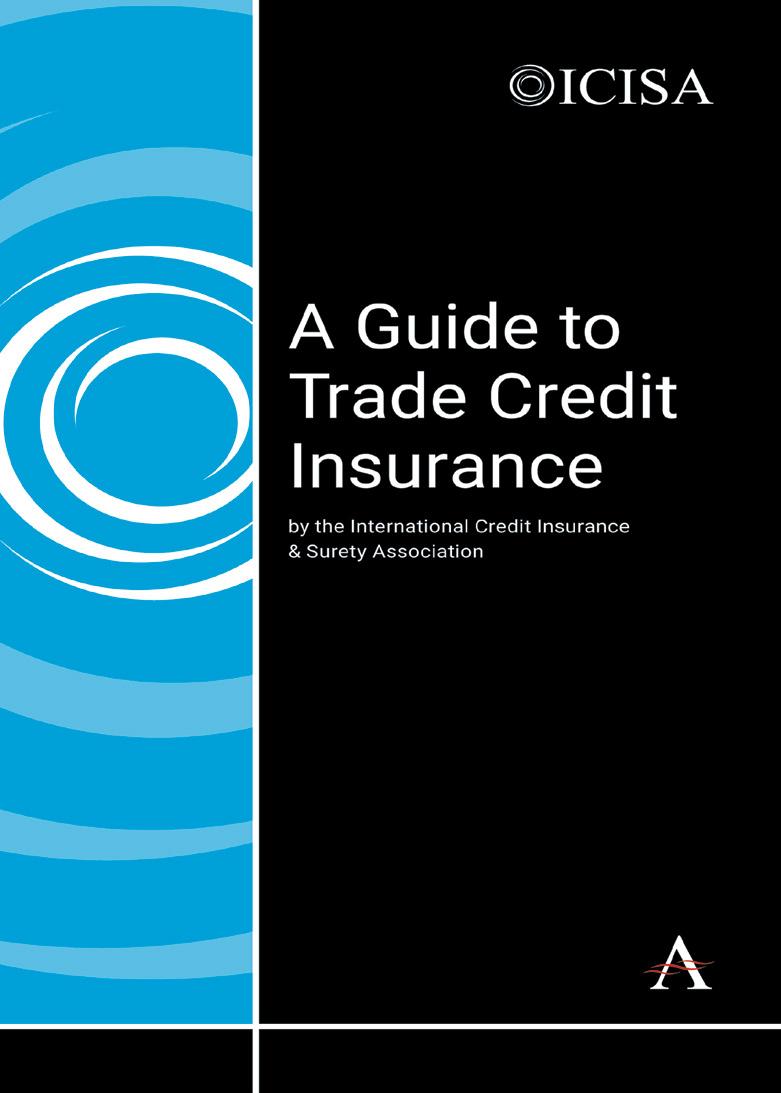
This compact volume is a practical guide for anyone interested in Trade Credit Insurance. The International Credit Insurance & Surety Association (ICISA) presents an approachable but detailed guide written collaboratively by carefully selected industry experts. The guide describes the lifecycle of the credit insurance product, from the initial application stage to the expiration phase of the policy, including practical use aspects for credit managers. The volume offers compact information on the history of trade, the need for protection against trade credit risks, and solutions offered by credit insurance providers. The focus is on short term credit, including whole turnover policies and single risk policies.
Readership
Suitable for anyone interested in Trade Credit Insurance, from credit managers to policymakers.
Importance
• Collaboration of a diverse group of experts from top organisations around the world
• Written in an approachable style, accessible to the non-specialist
• Includes extended glossary of key terminology
• Includes a list of relevant resources for further reading
Content
Foreword; Introduction; Disclaimer; 1.What is trade?; 2. What is trade credit insurance?; 3. Product types; 4. Risk types; 5. Typical set-up of a trade credit insurance contract; 6. Premium, the price for cover; 7. Day-to-day policy management; 8. Buyer risk underwriting in trade credit insurance; 9. Debt collection; 10. Imminent loss and indemnification; 11. Renewal, expiry, termination of a policy; 12. Single risk business; 13. The single risk insurance market: Private and public players; 14. Reinsurance of Trade Credit Insurance; Trade Credit Insurance resources; Glossary of trade credit terminology
About the Author(s) / Editor(s)
The International Credit Insurance & Surety Association (ICISA) brings together the world’s leading companies providing trade credit insurance and surety bonds and their reinsurers. ICISA promotes technical excellence, industry innovation and product integrity, as well as addressing business challenges generated by new legislation.
Where to order my copy?
The book can be ordered from Barnes&Noble and Bol.com
17 | The ICISA INSIDER | April 2024
17 | The ICISA INSIDER | April 2024
Meet the underwriter: Frédérique Maris on the start of her career in Surety

Frédérique Maris is a Surety Underwriter who has recently moved from Cologne to Rotterdam to join Zurich Surety. She enjoys building relationships and tackling challenges in risk management, finding her job rewarding and diverse. Despite facing obstacles, like moving during the pandemic, Frédérique remains resilient. She believes in active networking and making the industry more visible to attract diverse talent, especially women. Here's an interview with her, which we hope will shed some light on anyone interested in the industry and how it is perceived by young talent.
In the vibrant city of Cologne, Frédérique had spent the last two years working as an Underwriter Assistant at DEVK RE. However, a month ago, she made the decision to return to her hometown, Rotterdam. Both cities hold a unique charm for her, with their busy riverbanks, vibrant streets, rich architecture, and international business opportunities. Despite their differences, Frédérique feels a deep connection to both, both on a personal and professional level.
"As someone who experiences the allure of both Cologne and Rotterdam, I appreciate the unique blend of vibrant culture and international business opportunities each city offers," Frédérique remarks.
As a Surety Underwriter, Frédérique finds immense fulfillment in her job. What she loves most is that it involves people's work. Whether she is engaging with insurers and MGA's as a reinsurer, or now working on the direct side, conversing with a local contractor, she finds that working with people truly energizes her. Frédérique believes that interpersonal relationships are crucial for risk management, especially in challenging times such as handling claims or navigating through economic and geopolitical crises. She also finds the opportunity to acquire knowledge in legal, economic, environmental, and political areas incredibly rewarding. Drawing from her studies in Corporate Law and Strategy Economics, she appreciates the multidisciplinary nature of her work, which makes her job more than just a profession.
"Working as a Surety Underwriter allows me to engage with a diverse range of individuals and develop a deep understanding of the complexities of risk management," Frédérique explains.
Although Frédérique does not have one specific mentor, she considers her previous colleagues at DEVK RE and her new colleagues at Zurich as mentors. Their collective experience and guidance are invaluable to her. Moving abroad to start her first job in Cologne during the pandemic is one of Frédérique's proudest achievements. Despite the challenges of speaking a different language at the office and adjusting to cultural differences, she embraces the experience wholeheartedly, making new friends and overcoming obstacles along the way.
Since joining the industry, Frédérique often finds herself in meetings with highly experienced and knowledgeable individuals. While these interactions are educational, it is sometimes challenging for her to find her own voice and contribute meaningfully to the conversations. Her advice to young people starting their careers in the industry is to network actively. Frédérique believes that the credit insurance and surety sector is a small world with many experienced individuals who are eager to share their knowledge.
Reflecting on the lack of young people, especially young females, in the industry, Frédérique believes that increasing visibility and making the industry more tangible are key. She feels that the industry offers diverse opportunities with a societal impact, such as facilitating the transition to renewable energy and contributing to a safe and stable business environment. Frédérique emphasizes the importance of active recruitment efforts to attract more diverse talent to the industry, particularly women, and expresses her willingness to contribute to such initiatives.
"As an industry, we need to actively recruit and showcase the opportunities available to young talent, particularly women, to ensure a more diverse and inclusive workforce," Frédérique concludes.
| 18 April 2024 | The ICISA INSIDER
| Interview
Peak Re joins ICISA
A conversation with Kathleen Koh
Peak Re in a nutshell

As a global reinsurer headquartered in Hong Kong with a subsidiary in Zurich, Peak Reinsurance Company Limited, commonly known as Peak Re, has steadily grown since its inception in 2012. Ranking 27th among global reinsurance groups, Peak Re specializes in providing both Property & Casualty and Life & Health reinsurance solutions to approximately 600 clients across 58 different markets. With a focus on fostering strong partnerships and offering innovative and tailored reinsurance, risk management, and capital management solutions, Peak Re has garnered industry recognition, including winning the "Asian Reinsurer of the Year" award for seven consecutive years.
 Kathleen Koh, Director, Underwritting at Peak Re, Credit & Surety
Kathleen Koh, Director, Underwritting at Peak Re, Credit & Surety
When asked about Peak Re's motivation to join ICISA, Kathleen emphasizes the importance of networking and knowledge exchange among members. "Besides networking, the key motivation is knowledge exchange amongst members and keeping oneself abreast of the market trends for credit & bond," she explains.
As an ICISA member, Kathleen highlights their expectations: "To be able to contribute local knowledge, practices, and updates on local market trends." She talks about a particular interest in discussing topics such as the geopolitical impact on credit & bond, inflation, market losses, and emerging markets/sweet spots for credit & bond within ICISA.
Regarding participation in ICISA committees, Peak Re has already joined several, including the Asia Committee, Credit Committee, and Surety Committee.
Kathleen also sheds light on the mutual benefits of Peak Re's membership for both themselves and current ICISA members. "We certainly benefit from the seminars and workshops organized by ICISA," they note. "We would like to see more information exchange, which can be market or product-specific, as well as sharing best practices on emerging markets."
Through their participation in ICISA, Peak Re aims to contribute to and gain insights from the vibrant discussions and exchanges within the credit insurance and surety industry, further enhancing their position as a global reinsurance leader.
19 | The ICISA INSIDER | April 2024 Interview |
ANNOUNCEMENTS

Robbert Bozelie appointed Head of Atradius Special Products

Robbert Bozelie
Director of Special Products Company:
Atradius
Atradius has appointed Robbert Bozelie as Director of Special Products, effective 1 April 2024. Robbert brings a wealth of experience to this new role, most recently as Regional Director of Global NL and Nordics, a role he has fulfilled since 2013. Robbert joined Atradius in 1998 as Controller for various organisational units. In 2008, he assumed the role of Deputy Regional Director of Global NAFTA, based in Baltimore, and was promoted to Regional Director of Global NAFTA in 2010. In 2013, he returned to the Netherlands to take up his position at Atradius Global.
Robbert succeeds Olivier David, former Head of Special Products. Olivier made strong commitments and invaluable contributions to Atradius Special Products for the past 14 years until the end of 2023.
Axel Melkebeke appointed Head of ICP at Atradius
Axel Melkebeke joined Atradius in January 2024 as the new Head of Instalment Credit Protection (ICP). Axel has a long record of accomplishment in the financial sector in Belgium and Luxembourg with extensive commercial and people management experience.
Axel succeeds Leon Isebaert, who retired at end of 2023. Over his 15 years with Atradius, Leon successfully developed the ICP business with his great passion and strong leadership.
 Melkebeke Head of ICP Company: Atradius
Melkebeke Head of ICP Company: Atradius
| 20 April 2024 | The ICISA INSIDER
Axel

New appointments at Tokio Marine HCC

Leight Carnie
Head of Renewals (South)
Company: Tokio Marine HCC
Tokio Marine HCC has appointed Leigh Carnie as Head of Renewals (South) and Andy Aldridge as Head of Renewals (North). Previously, Leigh and Andy were both Underwriting Manager, Commercial.
Several new appointments at QBE Europe

 Aidan Quinn Head of Commercial Underwriterting
Company: QBE Europe
Aidan Quinn Head of Commercial Underwriterting
Company: QBE Europe
Aidan Quinn has been appointed as Head of Commercial Underwriting, Trade Credit. Aidan joins the European business from QBE's Australian division, where he held the role of Head of Commercial Underwriting based in Melbourne. He will oversee the service and renewal of the existing commercial portfolio while also seeking to grow the portfolio through the addition of profitable new business. Aidan will be based at QBE's Fenchurch Street offices in London.
Catalina Romero has joined QBE Europe as a Senior Risk Underwriter in the Trade Credit Team. Catalina has more than 15 years of experience in financial services and also joined the Trade Credit team this month. Previously, she held roles at Coface, Allianz and Barclays Bank, bringing a wealth of experience to the team.
Iain Bird has been appointed Head of Surety. Iain has more than 25 years of experience most recently with Great American, Travel and General, and Correlation Risk Partners.
21 | The ICISA INSIDER | April 2024 Announcements | The ICISA INSIDER | April 2024
New appointments at Credendo

During the annual General Meeting of Credendo – Guarantees & Speciality Risks, which took place on 2 April 2024, Credendo appointed Christoph Witte as new General Manager of its subsidiary specialised in excess-of-loss and top-up covers, single risk insurance and surety bonds.
Christoph Witte will replace Eckhard Horst, who held this position since 2012. After five years at Credendo – Export Credit Agency, Christoph Witte became Country Manager for Credendo – Short-Term Non-EU Risks Germany and Austria. In 2018, he additionally took up the responsibility of Country Manager for Credendo – Short-Term EU Risks Poland and then became General Manager of Credendo – Short-Term EU Risks in 2019.
During the same general meeting, Credendo has appointed Kerlijne Van Steen, currently Head of Single Risk and Surety Underwriting at Credendo - Guarantees & Speciality Risks, as Deputy General Manager of Credendo - Guarantees & Speciality Risks.
New team members at Zurich Insurance Europe

Laurens Groothuis
International Trainee
Company: Zurich

Frédérique Maris
Junior underwriter
Company: Zurich

Laurens Groothuis began his tenure at Zurich as an International Trainee. His initial role was in the Surety department at The Hague (NL), and he is currently one month into a five-month assignment in the CIG Credit Lines department in Frankfurt (DE), where he focuses on Surety, Trade Credit, and Special Engagements. His next rotation will be to the Brussels (BE) Financial Institutions department, before he ultimately joins the Surety team back in The Hague. Laurens simultaneously achieved bachelor’s- and master’s degrees in International Economics and Financial Law from Erasmus University Rotterdam and has prior entrepreneurial experience with startup businesses in the Amsterdam region.
Luc Hopmans joined Zurich as a Senior Underwriter Surety, strengthening the growing team. Luc is a seasoned trade finance and corporate coverage banker with extensive experience in relationship management of medium sized and large companies. He has been working 17 years for ING, holding various account management and trade finance positions of which a number of years in Italy and subsequently 14 years for BNP Paribas a.o. as Head of Trade Finance the Netherlands and international assignments in South Africa and Qatar.
Frédérique Maris joined Zurich Benelux as a junior underwriter. Prior to joining Zurich, she gained two years of experience in the global reinsurance sector at DEVK RE where she worked closely with her experienced colleagues in the area of Surety and Trade Credit. Frédérique has successfully completed her master’s degrees in Corporate Law and Strategic Economics at the Erasmus University of Rotterdam.

Luc Hopmans
Senior Underwriter Surety
Company: Zurich
| 22 April 2024 | The ICISA INSIDER
New appointments at Swiss Re

Carolina DiGiacomo
Head Credit & Surety North America
Company: Swiss Re

In January 2024, Carolina DiGiacomo assumed the role of Head Credit & Surety North America at Swiss Re, taking over from John Boulton who went into retirement. Carolina joined Swiss Re in September 2022 and is reporting to Martin Pfister (Global Head Credit & Surety). Carolina has more than 25 years in the credit & surety reinsurance industry working in North America and Latin America at companies including AIG, Employers Re (Swiss Re), Sompo/Endurance Re, and Chubb Tempest Re.
In her most recent role as Vice President of Underwriting at Chubb Tempest Re, Carolina successfully managed a portfolio of both casualty and surety treaty business. She has also been an active member of the Women In Surety networking group helping to bring more industry awareness to her peers. Carolina holds a Bachelor's of Science in Finance and International business from Florida International University (Miami, Florida).
Basil Louvaris joined Swiss Re's North America Credit & Surety as Vice President and Senior Underwriter in September 2023, reporting to Carolina DiGiacomo (Head Credit & Surety North America). Basil transferred from Swiss Re Corporate Solutions where he was the North America Trade Finance Geography Lead, a position he held since joining in March 2022. In Basil's current position, he is responsible for managing and executing the North America reinsurance strategy for Credit & Political Risk and assists in managing North America Surety treaties.
Basil has more than 25 years of structured credit, trade finance and political risk primary and facultative underwriting experience in both the US and London markets. Previously, Basil was a VP and the North America Manager of the Transactional Cover Unit at Allianz Trade and held similar roles at CV Starr and Chubb. Basil holds a BA (Hons) in International Business from the University of Central Lancashire (Preston, United Kingdom) and is fluent in Greek.
Anne Mariel Zimmermann appointed as Underwriter for Global Credit, Surety, and Political Risk of Navigators Re
Navigators Re, a brand of The Hartford and a global specialty reinsurance business, has appointed Anne Mariel Zimmermann as Underwriter for Global Credit, Surety, and Political Risk. Anne brings broad experience in country and credit risk management in the banking and insurance industries. She joins from Credit Suisse, where she was Head of Country Risk Appetite and Monitoring and Senior Credit Portfolio Manager, and prior to that was Senior Country Credit Risk Manager and Senior Political Risk Analyst at Swiss Re. Prior to entering financial services, Anne was an academic political economist focusing on the politics of development.

Basil Louvaris
Senior Underwriter
Credit & Surety
Company: Swiss Re

Anne Mariel Zimmermann
Underwriter Credit, Surety & Political Risk
Company: Navigators
23 | The ICISA INSIDER | April 2024
Announcements | The ICISA INSIDER | April 2024



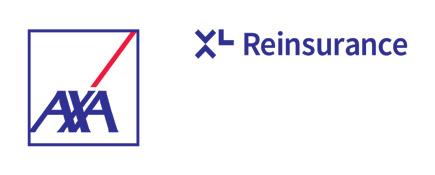





































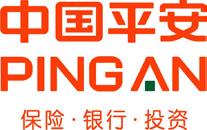
















secretariat@icisa.org

24 | The ICISA INSIDER | April 2024
ICISA Members
Evert van de Beekstraat 354
1118 CZ Schiphol The Netherlands
+31 (0)20 625 4115
Number: 64391736
www.icisa.org ICISA Registered







 Jerry San Vice-Chair of Asia Committee
Jerry San Vice-Chair of Asia Committee

 Nils Hoppenworth Chair of the Surety Committee
Nils Hoppenworth Chair of the Surety Committee

 Julian Spiegel Chair of the Single Risk Committee
Julian Spiegel Chair of the Single Risk Committee

 Thomas Meyer Chair of Credit Insurance Committee
Thomas Meyer Chair of Credit Insurance Committee

 Fabrice Nessi Chair of the Committee of Underwriters
Fabrice Nessi Chair of the Committee of Underwriters













 Kathleen Koh, Director, Underwritting at Peak Re, Credit & Surety
Kathleen Koh, Director, Underwritting at Peak Re, Credit & Surety


 Melkebeke Head of ICP Company: Atradius
Melkebeke Head of ICP Company: Atradius



 Aidan Quinn Head of Commercial Underwriterting
Company: QBE Europe
Aidan Quinn Head of Commercial Underwriterting
Company: QBE Europe





























































